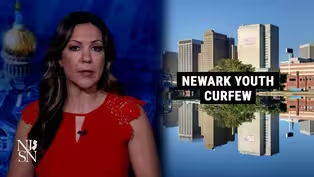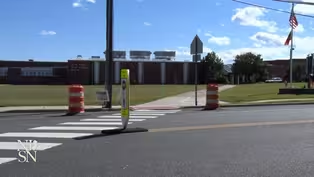NJ Spotlight News
NJ ombudsman on fixing care system for disabled residents
Clip: 7/9/2025 | 9m 10sVideo has Closed Captions
Interview: Paul Aronsohn, ombudsman
In his latest report, the state’s Ombudsman for Individuals with Intellectual or Developmental Disabilities and Their Families offers an urgent warning and blueprint to the administration of the next New Jersey governor on both the progress and failures of New Jersey's system of care for vulnerable residents.
Problems playing video? | Closed Captioning Feedback
Problems playing video? | Closed Captioning Feedback
NJ Spotlight News is a local public television program presented by THIRTEEN PBS
NJ Spotlight News
NJ ombudsman on fixing care system for disabled residents
Clip: 7/9/2025 | 9m 10sVideo has Closed Captions
In his latest report, the state’s Ombudsman for Individuals with Intellectual or Developmental Disabilities and Their Families offers an urgent warning and blueprint to the administration of the next New Jersey governor on both the progress and failures of New Jersey's system of care for vulnerable residents.
Problems playing video? | Closed Captioning Feedback
How to Watch NJ Spotlight News
NJ Spotlight News is available to stream on pbs.org and the free PBS App, available on iPhone, Apple TV, Android TV, Android smartphones, Amazon Fire TV, Amazon Fire Tablet, Roku, Samsung Smart TV, and Vizio.
Providing Support for PBS.org
Learn Moreabout PBS online sponsorshipWell, in his latest report, the state's ombbudzman for individuals with disabilities offers an urgent warning and a handbook of sorts for the next administration on both the progress and the abject failures of New Jersey's system of care for some of our most vulnerable residents.
One that's still rife with abuse, neglect, and unsafe conditions despite dire calls for change and a mountain of bureaucracy that families and caregivers need to tackle as they try to seek help.
Paul Aronson was appointed by Governor Murphy in 2018 to take on the newly created role.
And since then, his office has been in touch with hundreds of providers and advocacy organizations while also receiving thousands of complaints from individuals and families.
Paul Aronson is with me now to share what may very well be his last report.
And I want to start with that, start with the end because you noted that at the very beginning of this report that you are acutely aware that uh this may be your last uh several months in the office.
Does that leave you with sort of an unbridled feeling of let me lay it all out there for these policy makers?
Yeah, absolutely.
In fact, this this whole notion of sort of leaving it on the field is sort of my mindset right now.
I've been I've had the opportunity and it has been an opportunity to do this for seven years, a little over seven years.
And uh as I note in the report, uh this has probably been the most rewarding job I've ever had, but it's also been the most heartbreaking and infuriating job.
And so I just feel compelled to sort of leave a blueprint, if you will, leave leave some sort of thoughts for the the next administration, the next governor, and the next unbudsman.
Um, you wrote, "In each of my reports, I've asserted that New Jersey's system of care is a tale of two systems.
Uh, after seven years in this position, I know that to be undeniably true.
Why is that?
And what are those two systems?
What have you found?"
I found that, you know, on the one hand, we have a very good system, a strong system.
We have a lot of good people in and out of government.
We have a lot of resources that we devote uh to people with disabilities.
Billions.
Yeah.
Billions of dollars, children as well as adults.
We have a good provider community.
So, we've got a lot of good in our system.
But what we deal with in our office are those folks that are in essentially falling through the cracks in the system.
Folks that are that are experiencing abuse and neglect, folks that are not getting the supports and services they need.
Maybe they have severe challenging behaviors or medical complications or some combination of the two.
And so, that's what we deal with.
Um, you've called for urgent action not just in this report, but in each.
You and I have sat down and spoken since you took on this role and uh a lot of what is in this reflects what you found the very first year you took on the job to now.
Where are there areas that you feel the state has responded effectively and where is the progress um really slow?
I think you know on a day-to-day you know basis I think the the the our state our government uh you know is very responsive to the needs of folks uh children as well as adults and a lot of children's supports and services come through their school system.
Uh I think you know again the governor Murphy and the legislature have devoted a lot of resources uh to sort of providing supports and services for people with disabilities.
So that's that's the good news.
And I think on a day-to-day basis, you know, we have a government that responds and tries to do the right thing.
Uh systemically though, you know, what we have seen over the years is that there there there are shortcomings.
Uh you know, the abuse and neglect which we've been writing about and talking about and working on over the last several years, uh it continues.
Uh and and it's and it's it's throughout.
Uh I'm very careful not to try to quantify let's say it's most group homes or most anything.
I I I couldn't tell you that.
Uh in fact, I think most providers actually uh really try to do the right thing uh and try to do it in the right way.
But and yet there's there's still these years later of you taking on this role and I'm sorry for interrupting.
There's still um a lack of accountability.
There's still no onus on folks to do an investigation or to provide those findings to family members.
families have had to push, prod, plead to get those findings when a loved one has been abused or or even has died in the hands of these providers.
Um there's still this lack of transparency.
Absolutely.
And you you've hit on I think some of the some of the core challenges and opportunities.
Uh as I've said in the report and we we've discussed before, you know, a lot of this work is hard.
You know, whether you're on the front lines, you're as direct support professional or provider working in government trying to do the right thing.
Uh it's not easy.
But none of this is rocket science.
We know the way forward.
We know how to stop abuse and neglect through through, you know, the workforce, through paying, you know, direct support professionals a living wage to train them, to hold them accountable, to hold the provider agencies accountable.
I mean, we have a system right now that if a provider agency uh continues to do something wrong or doesn't follow through on a corrective plan of action, there's no financial penalty.
There's no repercussion really.
So, who is the system protecting then?
provider or the person that they're charged with caring for.
Yeah.
And one of the concerns and I sort of note this towards the end of the report is I I get this sinking feeling every once in a while that there's this too big to fail sort of mentality that there's a concern that we have to sort of be careful how we treat these provider agencies uh for fear that they'll sort of just pack up and leave.
And I don't think that's the case.
In fact, I have found some of the larger provider agencies and, you know, good ones trying to raise the bar on the on the rest of of, you know, sort of the industry, if you will.
But we we need more accountability.
We need investigations that are not right now, most of the investigations are conducted by the private agencies themselves.
That doesn't make any sense, right?
And even even if for an agency that tries to do it the right way and really devotes the resources to do it the right way, it's not going to have any credibility.
you know, if they come back with an unsubstantiated finding, which they often do, it's not going to be able to believe for the family and they have no closure on on a situation.
We have up on our screen right now just a poll from the report of some of the urgent calls that your staff and and you your staff, I say it's only a couple of people have received.
Um, what's your biggest concern for this next administration?
What do you hear most from families?
Uh I think you know I mean we we deal with abuse and neglect on on a daily basis.
We deal with again folks with severe challenging behaviors and medical complexities.
I think you know what I would say to the next governor, the next administration, you know, is just put people in in this office and in other offices that have that lived disability experience that that they get it.
I don't expect anyone particularly a governor who comes in and has to deal with a whole range of issues to be expert on disability issues.
But what I want, what I would urge them to do is to put in place people who have lived disability expense, people with disabilities, family members, put them throughout government, your on your policy staff, as as your commissioners, your assistant commissioners, put and certainly in in the budman role.
Uh because we, you know, we we see things differently sometimes.
We understand it as family members or as people with disabilities and we have that sense of urgency and that sense of urgency, I think, is what's missing most, frankly.
um take the last eight years worth of everything that you have uh learned and lived uh in this position.
Can you tick off for us just a couple of top recommendations?
I mean, that I think is maybe your number one priority, but um uh because families and and caregivers want want to see these things put into action.
I mean, they're the ones coming to you.
Are there just a couple of recommendations that you are leaving?
Absolutely.
I appreciate the question.
Staffing is the first thing.
I mean having the right people in the right place is absolutely important for any organization but particularly when you're running a state you know making sure that you have folks with lived disability experience not just running disability offices but also you know again throughout government because we want that sort of diversity of perspectives at the table.
We want folks that that understand it from a real life perspective sort of helping not just to be part of the conversation but actually driving that conversation.
So staffing is number one.
Uh number two, uh you know, the next governor really needs to sort of take a holistic approach to autism.
Uh I always say, you know, we we can't say one disability is more important than the other by by no means, but one in 29 children in the state of New Jersey, Yeah.
have autism.
We have one of the highest prevalence rates in the world.
And what we need to do is bring all the experts together, the folks in government, the folks in the academic community, uh the the advocacy community, families, bring them together and we need to sort of take again a holistic approach looking at providing the right level of services and supports for children as well as adults.
Paul Aronson, uh thanks for your work in this role and thank you for being available to us throughout it.
Thanks for coming in.
Thank you.
Curfew for Newark youth begins this week
Video has Closed Captions
Clip: 7/8/2025 | 1m 13s | Residents 18-years-old or younger must be home between 11 p.m. and 5:30 a.m. (1m 13s)
Is DEP eyeing changes to controversial flood rules?
Video has Closed Captions
Clip: 7/8/2025 | 4m 48s | REAL Rules would update flood risk zones, toughen building standards (4m 48s)
Toms River schools to raise taxes nearly 13%
Video has Closed Captions
Clip: 7/8/2025 | 5m 10s | The school district tried to file for bankruptcy, state said no (5m 10s)
Providing Support for PBS.org
Learn Moreabout PBS online sponsorshipSupport for PBS provided by:
NJ Spotlight News is a local public television program presented by THIRTEEN PBS














